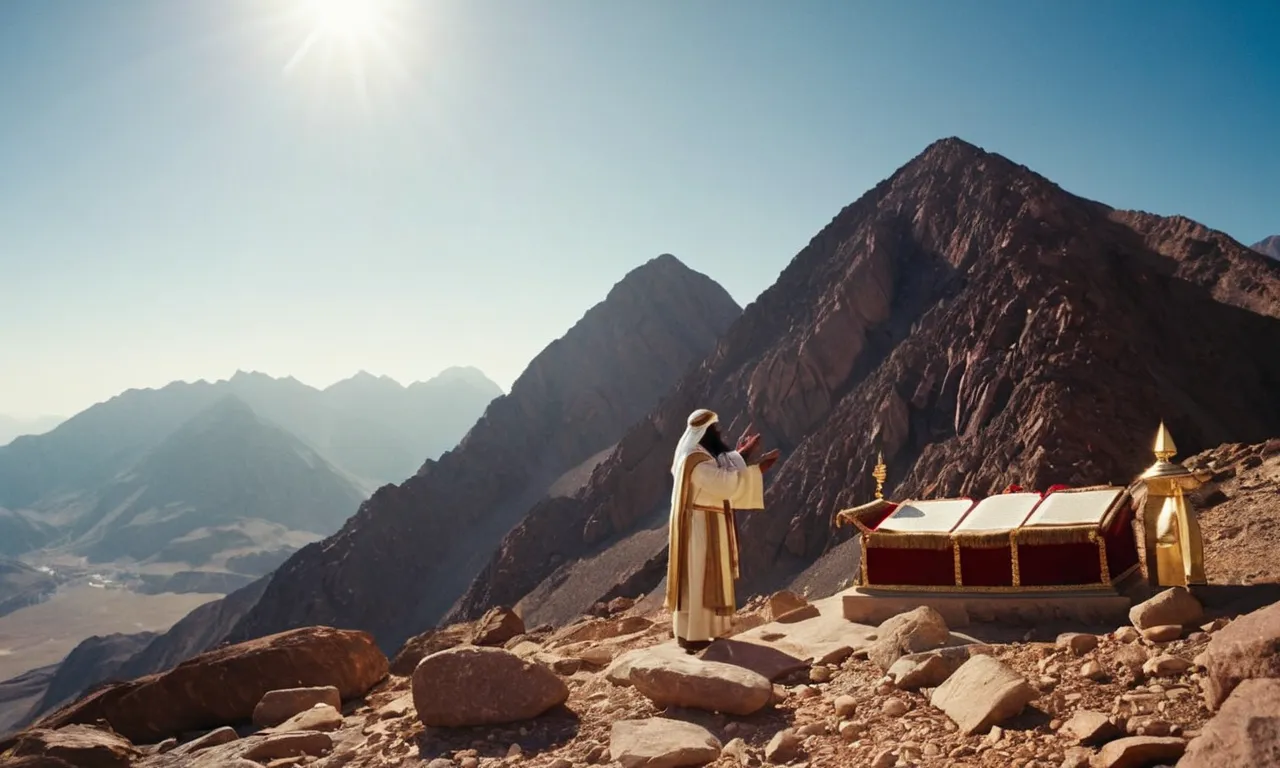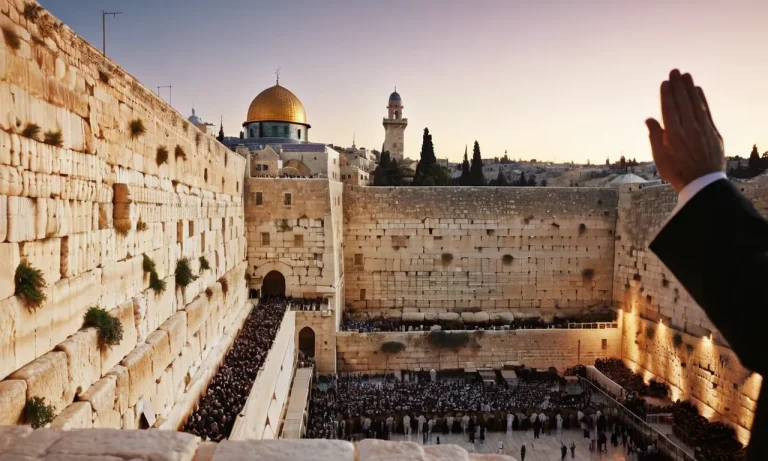What Did God Promise Moses? A Complete Overview
If you have ever wondered what promises God made to Moses in the Bible, you’re not alone. Many people are curious about the covenants and commitments that God established with this iconic biblical figure.
If you’re short on time, here’s a quick answer to your question: God made several major promises to Moses, including rescuing the Israelites from slavery in Egypt, leading them to a land ‘flowing with milk and honey’, making Moses a great leader, providing laws and guidance for righteous living, and establishing an everlasting covenant with the Israelites.
In this comprehensive article, we will explore the key promises that God made to Moses during their encounters described in the Book of Exodus and other books of the Torah. We will examine the background and context of these covenants, analyze the specific commitments God made, and reflect on the significance of these promises for the Israelites and for spiritual seekers today.
God’s Promise to Rescue the Israelites from Slavery in Egypt
The Israelites’ Cry for Help
The book of Exodus opens by describing the dire situation of the Israelites in Egypt. They had been enslaved for over 400 years, forced into backbreaking labor and oppressed by the Egyptians in every way (Exodus 1:8-14).
The Israelites cried out desperately to God to save them from their miserable existence (Exodus 2:23-25). Despite generations of slavery, they had not abandoned their faith in the God of their ancestors.
Their heartfelt prayers and cries ascended to God, who heard their plea and prepared to take action.
God Appoints Moses as Their Savior
God appointed Moses to be the leader and deliverer who would free the Israelites from oppression in Egypt (Exodus 3:7-10). When God first spoke to Moses through the burning bush, He made a promise: “I have indeed seen the misery of my people in Egypt.
I have heard them crying out…And now the cry of the Israelites has reached me, and I have seen the way the Egyptians are oppressing them. So now, go. I am sending you to Pharaoh to bring my people the Israelites out of Egypt” (Exodus 3:7,9-10).
As an 80-year-old shepherd, Moses felt inadequate for the task. But God promised to be with him and give him the words to speak. God was faithful to His promise by supernaturally empowering Moses for the assignment.
The Promise of Dramatic Miracles and Supernatural Aid
To convince Pharaoh to let His people go, God promised Moses that He would strike Egypt with wonders and miraculous signs (Exodus 3:20). In Exodus 7-12, God displayed His awesome power through 10 supernatural plagues, each targeting one of the Egyptian gods, such as the plague of darkness (Exodus 10:21-23).
Pharaoh’s magicians even declared, “This is the finger of God!” (Exodus 8:19). By humbling the proud Egyptians, the plagues revealed the Lord’s mighty hand of deliverance. God promised to demonstrate His supremacy over Egypt’s false gods, and He fulfilled His word.
The final plague, the death of the firstborn sons, broke Pharaoh’s resistance once and for all (Exodus 12:29-32). God kept His promise by unleashing His divine judgments until the Egyptians begged the Israelites to leave their land.
God’s Promise to Lead the Israelites to a Land ‘Flowing with Milk and Honey’
A Land of Prosperity and Abundance
When God promised Moses He would lead the Israelites to a land “flowing with milk and honey” (Exodus 3:8), He was referring to the abundance and prosperity the land would provide. This expression depicted a fertile land full of lush pastures where cattle could graze and produce an abundance of milk.
The honey referred to the nectar bees would collect from flowering plants and trees. Together, these symbols represented a land of plenty, with rich soil for crops, grass for livestock, and flowers for bees to make honey.
God was promising to bring His people out of the desert wilderness and into a profoundly fruitful region overflowing with natural resources. This land of Canaan would be the complete opposite of the barren desert the Israelites had wandered in for 40 years.
It was a “land of wheat and barley, of vines and fig trees and pomegranates, a land of olive trees and honey” (Deuteronomy 8:8). The Israelites would no longer struggle to survive but would prosper and thrive in abundance.
The Promised Destination after the Exodus
The promise of a land flowing with milk and honey was a key motivation for the Israelites to leave Egypt in the Exodus. After 400 years of slavery in Egypt, God called Moses to lead His people to freedom and head for Canaan, referred to as a land flowing with milk and honey (Exodus 3:8).
This abundant land was their destination following the Exodus and represented the fulfillment of God’s covenant promises.
The image of a lush, fruitful land would have resonated deeply with a nation about to embark on a difficult journey through the wilderness. It gave them hope and a vision of the blessings waiting for them in Canaan.
Though they faced trials and challenges ahead, God had not freed them from Egypt just to let them perish in the desert. His plan was to bring them into the Promised Land where they would flourish under His blessing and care.
A Fulfillment of God’s Covenant with Abraham
When God promised Moses He would bring the Israelites into the land flowing with milk and honey, He was fulfilling the covenant He had made 400 years earlier with Abraham in Genesis 15. At that time, God vowed to give Abraham’s offspring the land of Canaan as their inheritance forever.
The promise was then passed down to Isaac and Jacob.
As descendants of Abraham, the Israelites were heirs to this covenant promise. By rescuing them from Egypt and guiding them to Canaan, God was keeping His covenant commitment to Abraham. Though it took centuries to unfold, God proved faithful to His promise that Abraham’s descendants would not only inherit the land but also experience the fulfillment of living in a land abundant with natural resources and agricultural prosperity.
God’s Promise to Make Moses a Great Leader
Moses’ Insecurities and Self-Doubt
When God first appeared to Moses in the burning bush and called him to lead the Israelites out of Egypt, Moses was filled with doubts about his own abilities. After all, Moses had tried and failed 40 years earlier to deliver his people from bondage.
Fleeing Pharaoh’s wrath, Moses had been living a quiet life as a shepherd in Midian. “Who am I that I should go to Pharaoh and bring the Israelites out of Egypt?” Moses asked the Lord (Exodus 3:11). Despite God’s reassurances, Moses continued to express his insecurities, insisting he was not eloquent enough for this daunting task (Exodus 4:10).
Understandably, Moses lacked confidence in himself after previous failures. Thankfully, God does not call the equipped, but equips the called.
Reassurance of God’s Presence and Provision
To reassure Moses, God promised His personal presence and provision at every step. “I will be with you” became the rallying refrain (Exodus 3:12). God said He would give Moses the words to speak before Pharaoh (Exodus 4:12).
God also promised to perform miraculous signs and wonders through Moses to convince Pharaoh to let His people go (Exodus 3:20). In addition, God assured Moses that He heard the cries of the suffering Israelites and was ready to rescue them (Exodus 3:7-9).
God would bring His mighty power to bear on their behalf. Though Moses remained reluctant, God’s divine calling and promises were compelling. In the end, Moses chose to trust and obey despite his fears.
Bestowal of Miraculous Powers
To equip Moses for the task ahead, God granted him special miraculous powers. First, God transformed Moses’ staff into a snake and back again as a sign of authority (Exodus 4:3-4). Later, this staff would bring about the famous plagues on Egypt.
Next, God gave Moses the ability to turn his hand leprous and restore it, demonstrating God’s power over disease (Exodus 4:6-7). Finally, God enabled Moses to turn water from the Nile River into blood, foreshadowing the first plague (Exodus 4:9).
Though Pharaoh’s magicians could mimic some of these miracles, God’s superior might would prevail in the end. With God’s presence and these miraculous signs, Moses became a great leader for a great deliverance. Truly, God equipped Moses powerfully for the monumental mission ahead.
God’s Promise to Provide Laws and Guidance for Righteous Living
The Ten Commandments and the Sinai Covenant
After freeing the Israelites from slavery in Egypt, God made a covenant with them at Mount Sinai. As part of this covenant, God gave Moses the Ten Commandments, which established laws to guide righteous living (Exodus 20).
These laws covered honoring God, honoring parents, not murdering, not committing adultery, not stealing, not bearing false witness, and not coveting. By following these commandments, the Israelites would be God’s “treasured possession” and a “kingdom of priests and a holy nation” (Exodus 19:5-6).
Laws Regarding Sacrifice, Justice, and Community
In addition to the ethical guidelines of the Ten Commandments, God gave many specific commands to establish a just, God-honoring community. There were laws about proper sacrifice, atonement for sins, religious festivals, tithing, and caring for vulnerable groups like orphans, widows, and foreigners (see Leviticus & Deuteronomy).
Other regulations covered manslaughter, theft, economic fairness, and impartial courts (see Exodus 21-23). Scholars see these as a blueprint for a model society.
A few interesting examples:
- The Year of Jubilee involved forgiving debts and returning land to original owners every 50 years (Leviticus 25:8-13)
- Judges were to show no partiality based on economic status or ethnicity (Leviticus 19:15)
- Gleaning laws allowed poor people to harvest leftovers from fields (Leviticus 23:22)
Instructions for Building the Tabernacle
As part of God’s covenant, the Israelites were to construct a holy tabernacle for worship and sacrifice. God gave Moses meticulous instructions on how to build this, specifying dimensions, materials, and decorations down to precise details (Exodus 25-31). For example:
| Ark of Covenant: | 45 inches long x 27 inches wide x 27 inches tall, overlaid with gold inside and out, carrying the stone tablets of the Ten Commandments |
| Altar of Incense: | 18 inches x 18 inches x 36 inches tall, overlaid with pure gold, for burning incense before God |
Following these plans, craftsmen built the tabernacle exactly how God designed it (Exodus 36-40). This showed the importance of doing religious duties God’s way, not our own inventions.
God’s Promise to Establish an Everlasting Covenant with the Israelites
A Chosen and Holy People
God promised Moses that He would make a covenant with the Israelites and establish them as His chosen and holy people. As part of this covenant, God would bless the Israelites and make them prosper if they obeyed His commandments and statutes (Exodus 19:5-6).
This special relationship reflected God’s love and grace in choosing the Israelites out of all the nations on earth. God wanted the Israelites to be a kingdom of priests and a holy nation – set apart and dedicated to serving Him.
This covenant promise gave the Israelites a unique religious identity and purpose.
Blessings for Obedience, Curses for Disobedience
As part of the covenant, God also promised that there would be great blessings for obedience and severe curses for disobedience (Deuteronomy 28). If the Israelites carefully followed God’s laws, they would be blessed with prosperity, success, abundant crops, victory over enemies, and more.
However, if they turned away to worship false gods, they would be cursed with disease, famine, poverty, defeat, exile, and other calamities. This established important incentives for the Israelites to remain faithful and obedient to God’s commands.
It also showed that covenant obedience was a matter of life and death in both physical and spiritual terms.
A Lasting Commitment to Guide and Sustain
Most importantly, God promised Moses that this covenant would be everlasting – it would endure forever as an unbreakable commitment between God and His people (Genesis 17:7, 13, 19). God pledged to be the God of the Israelites and their descendants forever.
He would guide, sustain, and protect them as their faithful covenant partner throughout all generations. This promise gave the Israelites assurance and confidence that God would always be with them, even through difficult times of wilderness wandering, conquest, exile, and more.
It reflects God’s eternal lovingkindness and faithfulness in relating to His people (Exodus 34:6-7).
Conclusion
In closing, the promises that God made to Moses were truly extraordinary in scope. They included deliverance from suffering, support in leadership, divine laws and instructions, and an everlasting covenant with the Almighty.
These promises gave Moses and the enslaved Israelites hope in desperate times. They also established a binding relationship between God and the people of Israel. Even today, these covenants remind us of God’s enduring faithfulness and love.








